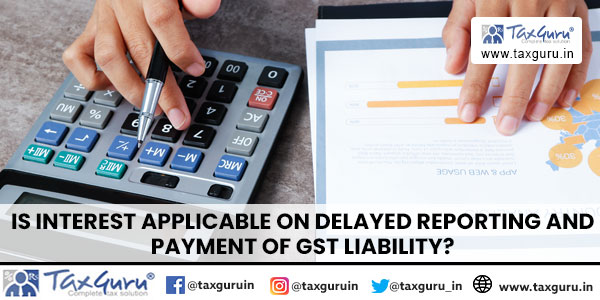Summary: The applicability of interest on delayed GST payments hinges on whether the liability was offset using balances in the E-cash or E-credit ledger. Section 49 of the CGST Act, 2017, allows payment of GST liability using these balances, while Section 50 mandates interest on delayed payments, calculated on the gross tax amount. However, disputes arise when liabilities are reported late in GSTR-3B but covered by existing ledger balances. Many argue that interest should apply only to the net amount payable after considering available balances, as these funds are already with the GST authorities. The Gujarat High Court, in Arya Cotton Industries v. Union of India (2024), ruled that interest should not apply for the period between deposit in the E-cash ledger and return filing. Similarly, for ITC reversals, netting off has been permitted, reinforcing that interest should apply only to cash liability beyond ledger balances. Further, entities argue for cross-utilization of E-cash ledger balances across GSTINs under a single PAN using PMT-09. Applying interest on the gross value is seen as beyond legal authority, as balances in E-cash and E-credit ledgers already represent discharged obligations. Stakeholders await clarity on potential amendments to align interest computation with this principle.
Background
With this, we shall look upon if demand of interest on delayed payment of tax on outward supply is actually attracted where the tax liability is actually paid either through balance already available in E-cash Ledger or E-credit Ledger of the entity.
Law Provisions
GST Law categorically under Section 49 of the CGST Act, 2017 permits payment of tax liability either through balance available in E-cash ledger or input tax credit (ITC) accumulated in E-credit Ledger. The liability could have been be determined by the tax payer himself on self-assessment or demanded under Section 73/ 74 of the CGST Act, 2017.
Section 50 triggers applicability of interest when there is delay in discharge of tax liability to the exchequer on account delayed reporting in GSTR-3B and thus, delayed payment of tax. The interest is applicable on the entire amount of tax payable on such supply and not on net amount which is in excess to the balance already available in E-cash or E-credit ledgers, unless it is only a case of delayed filing of GSTR-3B.
Should netting off benefit with E-cash and E-credit ledgers’ balances from the tax liability payable be allowed?
1. Cash once deposited in E-cash Ledger, the registered person is left with no access to appropriate such funds for the reasons other than provided in the GST Law. Hence, when the department is already maintaining the funds to the credit of the entity and when adjustment of tax payable on such delayed payment is permitted through such balances under GST Law, interest should be levied on the net value that is actually pending to be paid.
2. Inference is similar to the basis which such net off was recently permitted for reversal of ITC wrongly availed and thus, levying interest on component payable through cash only. It would not be proper and rather would be discriminatory to levy interest differently on tax payable on outward supply and tax payable through reversal of ITC when essentially final impact in both the case is indeed same.

3. In continuation to above, even the balance maintained in E-Cash Ledgers of distinct persons of the entity, that is to say, all GSTINs on a single PAN should be netted off for computing interest liability as the entity can always transfer its balance in E-cash Ledger amongst its GSTIN through PMT-09 in due accordance with provisions of GST Law.
This is on same lines basis which interest applicability on reversal of ineligible ITC was to be considered after aggregating the tax heads which are available for cross-utilization in E-credit ledger amongst themselves.
4. Applying interest on gross value would also be beyond authority of law as in fact the default is limited to the liability which is payable in cash by the entity excluding the existing balances in E-cash or E-credit ledgers as such balances are already available with GST Authorities
5. Placing reliance on Hon’ble High Court of Gujarat in case of Arya Cotton Industries Versus Union of India dated 14.06.2024, it was ruled that once the amount deposited is credited to the account of the Government, the tax liability stands discharged on the said date subject to setting off by debit in E-cash ledger for accounting purpose at the time of filing of return to set off liability against such deposit of the amount which was credited to the account of the Government and therefore, interest would not be levied from the date of deposit in the account of the E-cash ledger till the date of filing of the return.
Given the above, it would be note worthy to witness if amendment in this regard is evaluated on the similar apparent premise for computing interest liability on ITC wrongly availed however pending to be utilized.
****
Author: Vaishali Jain, FCA, B.Com (H), is a Manager in the Indirect Tax division of a leading Indian CA firm in Delhi NCR. Contact: cavaishalijain19@gmail.com.





In Gujarat many tax payers received consolidated notice from July’2017 to Mar’2024.This article will be useful for many like me.Thank You for preparing and sharing this Article.